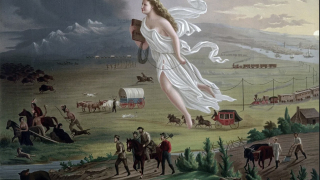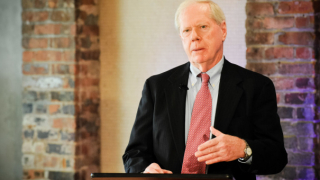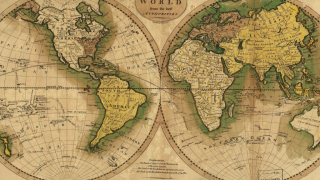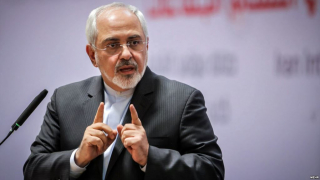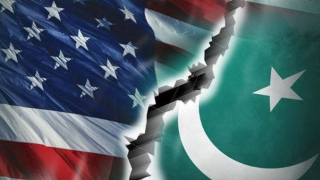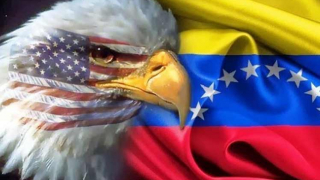Two Covenant Nations: Serbia and America
In an essay several years ago, we looked at the likenesses and differences between the histories of Serbia and Dixie, particularly as it relates to the deaths of two key figures in the history of each, Martyr-Tsar Lazar and General Stonewall Jackson. An essay by Fr Milorad Loncar about Serbia’s God-given path, ‘The Heavenly Kingdom in Serbia’s Historic Destiny’, gives us the opportunity to do some similar comparing and contrasting between Serbia and the Yankee American Empire that swallowed up the South after 1865 and holds her captive to this day.
The first item of notice is the religious foundation of each. Serbia can trace her Christian origins to missionaries from the Orthodox Church, which has remained faithful to the teachings of Christ’s Holy Apostles:
‘The Serbian people began to formulate their spiritual identity during the era of the Holy Brothers Cyril and Methodius (9th century), and their 5 disciples who followed (10th century). They are considered the first baptizers and enlighteners of the Serbs, as well as the other Slavs. The fruit of their work, harvested for some 2 centuries from Byzantium/Bulgaria to the Adriatic, included the gradual Christianization of the Serbs both nationally and individually, the appearance of the first ascetics and saints among the Serbs, and the first monuments of Serbia’s spiritual and secular cultures.’
--Fr Milorad
The same cannot be said of the main body of colonists who settled New England. They were rebels against the Anglican Church, who were themselves rebels against the Roman Catholic Church, who likewise were rebels against the Orthodox Church. This distillation and concentration of rebelliousness against God and the authority of the Church He established likewise bore fruit in spiritual and secular fields, as we shall see.
Fr Milorad goes on to describe the Orthodox culture that matured in Serbia:
‘Starting with the time they accepted Orthodoxy and considering the subsequent history and behavior of the Serbs, it is easy to discern the basic nature of their spiritual identity. This fundamental ethos especially manifested itself from the time of Saint Sava (12th-13th centuries) and was revealed in its fullness at the Battle of Kosovo in the Serbian spiritual and historic decision to choose the Kingdom of Heaven. . . .
‘This preference for spiritual values became an inseparable part of the Serbian national soul, as well as its lifeblood in the early stages of its history. The first evidence of this appeared among the Serbian saints, who through their ascetism, virtues, and suffering were constructing a spiritual ladder to the Kingdom of Heaven for their people and who exemplified through their lives the manner in which the world, the path of history, and man’s deeds within it should be evaluated.
‘ . . .
‘The spiritual transfiguration of Serbia in the era of Saint Sava and the other members of the Nemanjic dynasty was multifaceted. Because of the creative genius of the Church and state, it was enriched by the inclusion of folk culture (the patron saint’s day celebration, Christmas customs, the cult of ancestors, etc. …), as well as the organizational culture and art of society at large (communes, Church-people assemblies, communities, etc. …). The highest architectural and artistic accomplishments in hundreds of Serbian churches and monasteries, the biographical literature, the liturgic-monastic literature, and the state constitutional literature have made and are making “Svetosavlje” to be understood as the authentic Christian experience of the Serbian nation, or, put another way, as Orthodoxy realized in the historic experience, one nation as a whole.
‘Among the many forces which contributed to the making of the nation’s spiritual life were the Serbian hagiographies (the “Lives of Saints”) of the Middle Ages. The first to pen one of the biographies was Saint Sava, who wrote a life of his father, Stefan Nemanja - Saint Simeon the myrrh-flower. At the same time his brother, Stefan “the First Crowned,” also wrote about the life of their father Nemanja. Other written works followed. They include the life of Saint Sava by his disciples Domentijan and Teodosije, several biographies of Serbian archbishops and kings, life stories about holy women (St. Anastasia, St. Helen of Anjou, St. Petka, St. Euphemia), the lives of Serbian hermits (St. Procor, St. Peter Koriski, Isaia of Hilandar), as well as the lives of Serbian martyrs (St. John Vladimir - as early as the 11th Century, St. Lazar of Kosovo, the New Martyrs for Christ, etc.)
‘In all of these hagiographical texts, which are concurrently historical, one finds the common theme of the opting for spiritual freedom and ethical values which transcend the bare historic level of this world and life in it to penetrate metahistory and eschatology. The historic notables are portrayed in a drama with a distinct purpose, the resolution of which is found in the freedom to choose in self-determination. The only true choice is one which, through personal self-denial and sacrifice, aspires to higher, everlasting aims - a choice which aspires to the Kingdom of Heaven. It is in this spirit that Saint Sava was biographically praised foremost for his personal acceptance of spiritual values and for his selfless service to God, neighbor, and nation.’
This is the fruit that a people bears who properly cultivates the Grace of God in the heart.
For the Yankees, alas, it is far different. The rebelliousness we mentioned at the outset manifested itself in the establishment of an ideology that denied the Kingdom of Heaven and instituted an anti-Kingdom of its own to supplant the Orthodox Church (or, rather, its tattered remnants in the Schismatic West), which does not aspire to heavenly things, nor produces holy saints, nor builds holy churches or monasteries. It is concerned solely with the affairs of this world, and we need not look very hard for a description of what this anti-Church honors as its greatest products. Former President Donald Trump, a proto-typical Yankee American, told us clearly in his speech of July 3rd, 2020, at Mt Rushmore what those folks treasure most:
‘Above all, our children, from every community, must be taught that to be American is to inherit the spirit of the most adventurous and confident people ever to walk the face of the Earth.
‘Americans are the people who pursued our Manifest Destiny across the ocean, into the uncharted wilderness, over the tallest mountains, and then into the skies and even into the stars.
‘We are the country of Andrew Jackson, Ulysses S. Grant, and Frederick Douglass. We are the land of Wild Bill Hickock and Buffalo Bill Cody. (Applause.) We are the nation that gave rise to the Wright Brothers, the Tuskegee Airmen -- (applause) -- Harriet Tubman, Clara Barton, Jesse Owens, George Patton — General George Patton — the great Louie Armstrong, Alan Shepard, Elvis Presley, and Mohammad Ali. (Applause.) And only America could have produced them all. (Applause.) No other place.
‘We are the culture that put up the Hoover Dam, laid down the highways, and sculpted the skyline of Manhattan. We are the people who dreamed a spectacular dream — it was called: Las Vegas, in the Nevada desert; who built up Miami from the Florida marsh; and who carved our heroes into the face of Mount Rushmore. (Applause.)
‘Americans harnessed electricity, split the atom, and gave the world the telephone and the Internet. We settled the Wild West, won two World Wars, landed American astronauts on the Moon — and one day very soon, we will plant our flag on Mars.
‘We gave the world the poetry of Walt Whitman, the stories of Mark Twain, the songs of Irving Berlin, the voice of Ella Fitzgerald, the style of Frank Sinatra — (applause) — the comedy of Bob Hope, the power of the Saturn V rocket, the toughness of the Ford F-150 — (applause) — and the awesome might of the American aircraft carriers.
‘...From this night and from this magnificent place, let us go forward united in our purpose and re-dedicated in our resolve. We will raise the next generation of American patriots. We will write the next thrilling chapter of the American adventure. And we will teach our children to know that they live in a land of legends, that nothing can stop them, and that no one can hold them down. (Applause.) They will know that in America, you can do anything, you can be anything, and together, we can achieve anything. (Applause.)
‘Uplifted by the titans of Mount Rushmore, we will find unity that no one expected; we will make strides that no one thought possible. This country will be everything that our citizens have hoped for, for so many years, and that our enemies fear -- because we will never forget that American freedom exists for American greatness. And that’s what we have: American greatness.’
There you have it: The Yankee ideal is the Titan who conquers and transforms God’s creation (be it people, animals, atoms, etc.) through the use of science and technology, and that process can never end. For if it did, there would no longer be any reason for America to exist, no goal for it to attain. Thus, as long as Yankee ideology reigns in America, it will be a menace to the world since it is constantly in need of a enemy/obstacle to overcome to justify its existence.
This is in direct contrast to the Orthodox virtues of the Serbs, who repudiate domination of others. Again from Fr Milorad:
‘The same is true of the Serbian kings and rulers, none of whom were praised in their biographies for warfare and conquest, but primarily for their piety, beneficial endowments, and especially for their zaduzbinarstvo. Zaduzbinarstvo - i.e., the building of churches, monasteries and humanitarian institutions with the intent to achieve personal salvation and benefit their people in a lasting way. It is important to point out that a significant characteristic of Serbian hagiographical literature is that “service to the people of one’s homeland” is always understood to equal service to “God’s people,” a phrase which is not defined by nationality but rather by eschatology and the Bible - i.e. a phrase which focuses on the elevation of a people into a “covenantal” unit which does not strive for conquest and domination in the world, but rather strives for self-denial and lasting spiritual values. This rendered understandable the fact that in the conscience and living tradition of the Serbian people the ideal heroes were holy men, emulated by the rulers themselves.’
The best modern illustration of the beneficial endowments of modern America again comes from Pres Trump, this time his Inaugural Address in 2017:
‘At the center of this movement is a crucial conviction, that a nation exists to serve its citizens. Americans want great schools for their children, safe neighborhoods for their families, and good jobs for themselves. These are just and reasonable demands of righteous people and a righteous public, but for too many of our citizens a different reality exists. Mothers and children trapped in poverty in our inner cities, rusted out factories, scattered like tombstones across the across the landscape of our nation, an education system flush with cash, but which leaves our young and beautiful students deprived of all knowledge, and the crime, and the gangs, and the drugs that have stolen too many lives and robbed our country of so much unrealized potential. This American carnage stops right here and stops right now.’
Schools, neighborhoods, factories – these define service to the American homeland, but, once again, none of these transcend the earthly horizon. The American Creed keeps its votaries rigidly devoted to the material world.
For Serbia, her Christian faith reached its peak on the field of Kosovo in 1389. Fr Milorad writes,
‘The Orthodox spirit of zaduzbinarstvo explains a recognized characteristic of the Serbian identity: throughout all the centuries of the past, and up until today, the spiritual and historic life of the Serbians has centered around and taken place at and within the churches and monasteries. They were and have remained the centers for national assemblies and gatherings, for self-examinations and validations, and the fundamental epicenters of faith in this great nation’s destiny. Without these holy places, the Serbian people would not be what they are - not only within Orthodoxy, but within Christendom overall. The Serbian people’s spiritual choice of Heaven over earth was manifested most fully and evidently in the fateful oral choice made in the historic battle of 1389, at which the Serbs faced the Turks on the Field of Kosovo. This choice was made by the soldiers and martyrs, who were led and given an example by the holy Prince Lazar, who himself died a martyr’s death. This exalted Christian tragedy was soon written and sung about in the Serbian Church and by folk poets. From it originated the concept of the Kosovo choice. . . .
‘“Kosovo, 1389, was a definite affirmation of the Christian identity of the Serbian people; it was experienced as the triumph of martyrdom and in no way as a defeat. It has been lyricized in the hymns of victory with radiance and joy that the God-blessed Serbian nation was crowned with a martyr’s wreath which, from that point on, became its true and indestructible zenith. It signifies the triumph of spirit over body, eternal life over death, justice over injustice, truth over deceit, sacrifice over avarice, love over hate and force. This is what Serbian Kosovo signifies as sung about in the epic folk poetry which was inspired by this monumental, historic event.” (Dimitrije Bogdanovic). “The Kosovo choice was undoubtedly the selection of freedom in a most difficult and destructive way, but the only sure way." (Zoran Misic).’
Yankee America reached her zenith at the Battle of Gettysburg in 1863 (July 1st to 3rd) during the misnamed Civil War (more properly called the War of Northern Aggression, or the War to Prevent Southern Independence), a battle which President Lincoln apotheosized in his famous speech, the Gettysburg Address, given on 19 November 1863:
‘Four score and seven years ago our fathers brought forth on this continent, a new nation, conceived in Liberty, and dedicated to the proposition that all men are created equal.
‘Now we are engaged in a great civil war, testing whether that nation, or any nation so conceived and so dedicated, can long endure. We are met on a great battle-field of that war. We have come to dedicate a portion of that field, as a final resting place for those who here gave their lives that that nation might live. It is altogether fitting and proper that we should do this.
‘But, in a larger sense, we can not dedicate -- we can not consecrate -- we can not hallow -- this ground. The brave men, living and dead, who struggled here, have consecrated it, far above our poor power to add or detract. The world will little note, nor long remember what we say here, but it can never forget what they did here. It is for us the living, rather, to be dedicated here to the unfinished work which they who fought here have thus far so nobly advanced. It is rather for us to be here dedicated to the great task remaining before us -- that from these honored dead we take increased devotion to that cause for which they gave the last full measure of devotion -- that we here highly resolve that these dead shall not have died in vain -- that this nation, under God, shall have a new birth of freedom -- and that government of the people, by the people, for the people, shall not perish from the earth.’
Here we run into the covenant that the New England Pilgrims formed amongst themselves, this alchemical pact that creates a new nation out of adherence to abstract political concepts, cut off from all historical precedents. The ‘martyrs’ at Gettysburg, as Pres Lincoln describes them, hallowed the ground of that battlefield, and it is for their sake that he and all subsequent generations of Yankee Americans must go forth into the world to conquer and subdue anyone they deem an enemy (first Dixieland, lately Syria and Yemen, with an eye always on Iran, Russia, and China), so that their ‘nation’ will always be experiencing ‘a new birth of freedom’.
The poetic expression of Lincoln’s ideas presented at Gettysburg, his jubilation in righteous conquests and slaughter for the sake of his pseudo-Kingdom, is found Julia Ward Howe’s song, ‘Battle Hymn of the Republic’. Some extracts:
‘Mine eyes have seen the glory
Of the coming of the Lord;
He is trampling out the vintage
Where the grapes of wrath are stored;
He hath loosed the fateful lightning
Of His terrible swift sword;
His truth is marching on.
‘Chorus
Glory! Glory! Hallelujah!
Glory! Glory! Hallelujah!
Glory! Glory! Hallelujah!
His truth is marching on.
‘ . . .
‘He has sounded forth the trumpet
That shall never call retreat;
He is sifting out the hearts of men
Before His judgement seat;
Oh, be swift, my soul, to answer Him;
Be jubilant, my feet;
Our God is marching on.
‘ . . .
‘In the beauty of the lilies
Christ was born across the sea,
With a glory in His bosom
That transfigures you and me;
As He died to make men holy,
Let us die to make men free;
While God is marching on.’
How far this all is from what Fr Milorad said earlier!
‘It is important to point out that a significant characteristic of Serbian hagiographical literature is that “service to the people of one’s homeland” is always understood to equal service to “God’s people,” a phrase which is not defined by nationality but rather by eschatology and the Bible - i.e. a phrase which focuses on the elevation of a people into a “covenantal” unit which does not strive for conquest and domination in the world, but rather strives for self-denial and lasting spiritual values. This rendered understandable the fact that in the conscience and living tradition of the Serbian people the ideal heroes were holy men, emulated by the rulers themselves.’
And he says further,
‘The ethic of Kosovo as the national covenant of Serbian history was even expressed by a contemporary of these events, the Serbian Patriarch Danilo III, when he lauded Knez Lazar and the Kosovo martyrs with these words in 1393: It is better to choose “death with honor and sacrifice, than life in shame,” and “let us die that we may live forever.” This and other similar liturgical and cult writings about Knez Lazar as a martyr and saint, in which his martyrdom was exalted to both a historic and a metahistoric ideal, soon became the source and inspiration of the well-known Kosovo cycle of epic poetry. This is especially evident in the poem “The Fall of the Serbian Kingdom,” in which Kosovo’s physical defeat was transformed into a spiritual victory, a Christian philosophy of tragic sacrifice converted into the moral base of the people’s mentality.
‘This is what made Kosovo to become and remain, in the minds of the Serbs, the place at which their historic destiny was “determined,” that is to say where they were spiritually oriented in the conviction that the resurrection of freedom and a new life can only be achieved through suffering and sacrifice. Kosovo was experienced and again many times reexperienced as our Golgotha, but also as the most certain way to the Resurrection. . . .’
But the typical Yankee American would rather kill others, even thousands of others, for the sake of spreading his covenant and creed than die self-sacrificially for it. The Serbs, sad to say, experienced the ‘terrible swift sword’ of the Yankee missionary zeal for themselves during the 1999 bombing campaign and beyond. Thus did the two covenants, of the Orthodox Kingdom of the Serbs and the anti-Kingdom of modern America, meet in battle. And though Serbia appears to have been defeated, the American Empire will not be victorious in the end, for its covenant is one of death, and not of life, being estranged from the Eternal Life of the God-man Jesus Christ, Who gives resurrection to those united to Him.
No, it is not the peoples and countries of the world who need any great enlightening as to the true nature of Lincoln’s America, but it is rather the peoples of the States themselves. To this end, Mr Enoch Cade wrote lately a moving essay for the Southern people, but the peoples of all the other States and ethno-regions that make up the current American Empire will hopefully heed it also. Writing about the ongoing Yankee invasion of Southern cities like Asheville, North Carolina, he says,
‘Perhaps there is an element of jealousy. For all their twaddle about “community,” theirs is fake, manufactured, non-organic, disposable, derived from spreadsheets, business plans and PowerPoints, nothing more than a grab bag of Frankfurt School for Dummies bullet points and fuzzy hipster bullsh*t that will vanish the minute enough of us get together and tell them to take their cr*p back to elsewhere. We Southerners have a land, a tradition, a people, a place, a patria that they do not have and will never have. At some level they know it. It violates their safe spaces.
‘But it is not just a Democratic thing. It is also a Republican thing. And as our old buddy Walt [Whitman] sermonized, it is the American thing. God said so! Permanent revolution, working ever upward and westward toward an Asheville continent, nay an Asheville planet, swarmed by rootless, hypermobile, cosmopolitan, atomized consumers consuming disposable consumables.
‘There is a technical term for these people: Americans.
‘Excelsior!
‘Fyodor Dostoevsky, the greatest prophet of our dark and murderous age, regarded Progress with loathing. In The Idiot, his great comic character Lebedyev at a boozy dinner party offers himself as an interpreter of the Apocalypse. “The star that is called Wormwood,” the polluter of the springs of life, Lebedyev holds, is the network of railroads spread over Europe.
‘The railroads symbolize progress; they represent science, materialism, “social justice”; they hurry with “noise, clamor and haste” for the “happiness of humanity,” carrying bread to the starving. And in doing so, the railroads have polluted the springs of life. They are accursed, Lebedyev says.
‘“And dare to tell me that the `springs of life’ have not been weakened and muddied beneath the ‘star,’ beneath the network in which men are enmeshed,” Lebedyev roars. “And don’t try to frighten me with your prosperity, your wealth, the infrequency of famine, and the rapidity of the means of communication… there is no uniting idea; everything has grown softer, everything is limp, and everyone is limp! We’re all, all of us, grown limp. . .”
‘Americanism – the American idea of progress, this process without destination, this Permanent Revolution, this nihilistic fanaticism to alter everything beyond recognition, to reduce man to nothing but a unit of consumption, to make all men Americans – is the star that is called Wormwood. And it must be rejected.
‘“It is history that teaches us to hope,” General Robert E. Lee counseled us. And I am hopeful. Americanism is built on a foundation of sand, on lies about humanity, history and the ultimate purpose of life and the destiny of man. I believe that we are living in the last years of the disastrous American experiment. The springs of life can and will be cleansed and restored. That is the task before is. All that is required is an act incomprehensible to the American mind: remembering. Remembering who we are.
‘It’s high time we get to work.’
Indeed. May God open our blind, scaley eyes.



